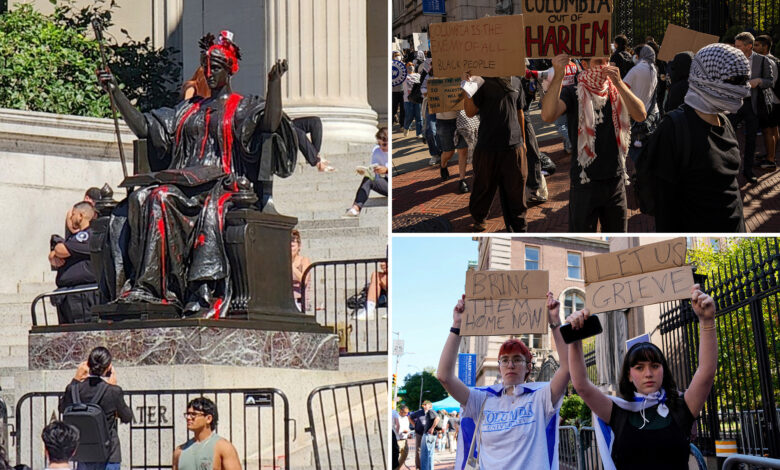Anti-Israel protesters swarm Columbia University as classes kick off

Dozens of screaming anti-Israel protesters swarmed Columbia University as classes kicked off Tuesday — resuming the chaotic demonstrations that paralyzed the Upper Manhattan campus at the tail end of last semester.
The rowdy demonstrators formed a picket line and banged drums as scores of students waited in lengthy lines to pass through security and gain access to the Ivy League school in Morningside Heights.
The protesters — including many brandishing signs declaring “Resist until victory” — could be heard chanting “Over 100,000 dead, Columbia, your hands are red” and “Don’t cross the picket line, we must honor Palestine.”
At one point, there were at least 150 students stretched around the block to enter via the tall iron gates at Broadway and West 116th Street.
The protest came just months after the Columbia campus descended into a cesspool of antisemitism at the end of the spring semester, setting off a wave of anti-Israel demonstrations at colleges nationwide.
Columbia’s embattled president Minouche Shafik abruptly resigned weeks ago following last spring’s “period of turmoil” during which she brought the NYPD onto campus twice to clear out tent encampments.
Since Shafik’s resignation, interim president Katrina Armstrong vowed to balance students’ rights to free expression and foster a safe learning environment for the fall semester.
The school also circulated new protest guidelines in a bid to limit disruption.
Just days ago, Columbia’s faculty-led antisemitism task force released a sweeping report detailing how “urgent” changes were needed in order to combat hate on campus in the wake of last year’s violence.
The 91-page report found the institution did little to stop the ostracization, humiliation and verbal abuse of Jewish and Israeli students in the wake of Hamas’ Oct. 7 attack on Israel — and that some professors even “minimized” students’ concerns of rising hate.
Frustrated students waiting to show their ID cards railed against the protesters for trying to disrupt the start of the semester Tuesday.
“There’s a lot of angry students who are blocking access to campus and trying to encourage students not to come to campus in solidarity with Gaza,” Aryeh Krischer, 28, told The Post as he tried to gain access.
“It’s certainly inconvenient,” the grad student added.
Lyell, a junior who only just transferred to Columbia, said he was caught off guard by the protests.
“I wasn’t expecting this. Not at all,” the political science student said, adding that he was certain to miss his very first class due to the heightened security measures and saga unfolding outside.
“I knew there were protests last semester and thought it would start back up. I don’t have an issue with protests but the university messed up by not having enough entrances for students to get in without delay,” Lyell said.
“It was pretty obvious this was going to happen because last week there were students with signs, so you’d assume it was going to happen again.”
Still, some students and faculty said they believed major disruptions on campus were all but inevitable.
“We are hoping for the best, but we are all wagering how long before we go into total lockdown again,” said Rebecca Korbin, a history professor who served on Columbia’s antisemitism task force.
“There haven’t been any monumental changes, so I don’t know why the experience in the fall would look much different than what it did in the spring.”
“There’s been a lot of efforts made by the university to hear and listen to students, including Jewish students. The bigger problem is there is a lot of denialism,” Krischer added.
“I have been sitting in the room when professors have denied certain antisemitic incidents never occurred at Columbia. I think antisemitism is a problem at Columbia but it will never get better until people acknowledge it’s a problem.”
Meanwhile, anti-Israel student organizers were undeterred and had already promised to ramp up their actions — including future encampments.
“As long as Columbia continues to invest and to benefit from Israeli apartheid, the students will continue to resist,” said Mahmoud Khalil, a graduate student.
“Not only protests and encampments, the limit is the sky.”
With Post wires




